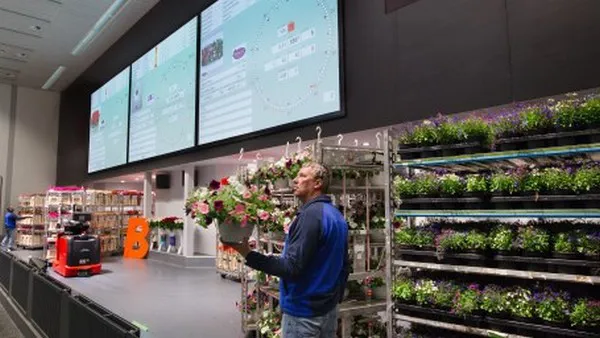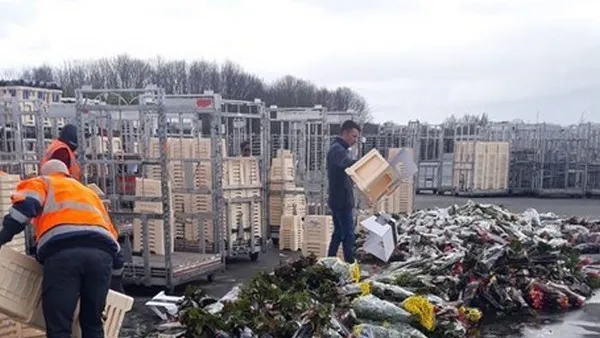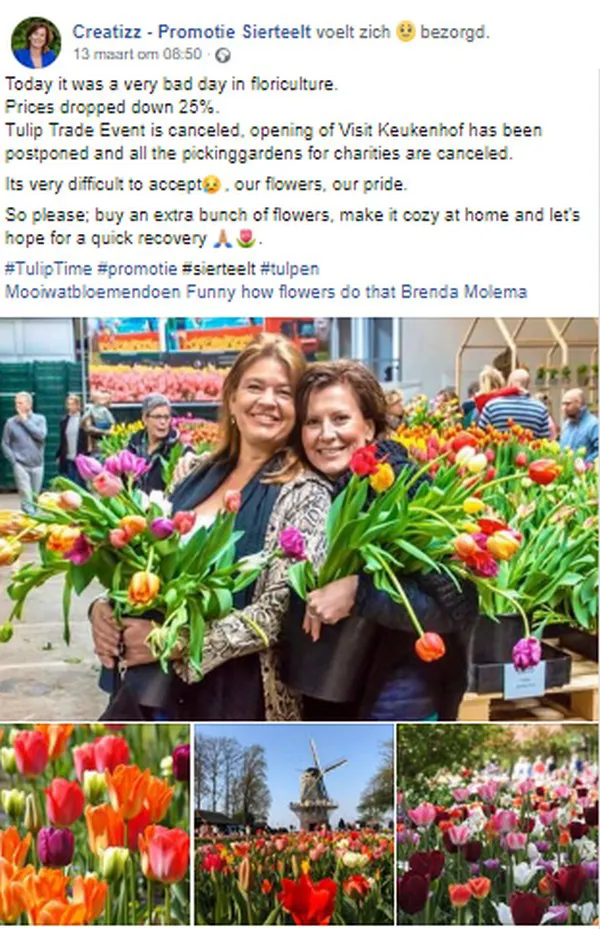The run-up to Mother's Day (May 10 this year) usually means busy times for the ornamental industry, Now, however, due to the COVID-19 frenzy, industries are hit hard, including the ornamental sector. Flowers and plants are not top of mind at the moment. "The market situation is dramatic", says Steven van Schilfgaarde, Managing Director of Royal FloraHolland. "Without emergency loans from the government and banks and other forms of financial support, healthy businesses will soon fall over. Branch-wide, we call for action before it is too late." And more industry members, not only in the Netherlands, call for support to help the industry to keep their heads above water.

The floriculture industry is the third export sector in the Netherlands and approximately 35% of global exports goes via the Netherlands. The export of flowers and plants amounts to 6.2 billion euros. (Source picture: Royal FloraHolland)
Low demand
Last Friday, March 13, 2020, 20% of the supply to the Royal FloraHolland auction in the Netherlands had to be destroyed because there weren’t any buyers for it, the auction reported.
This morning, this historically high percentage was much higher for flowers with almost 50 percent, for plants it was more than 30 percent. Today’s supply was already 25 percent lower than normal.
Over the past two weeks, prices were already lower than normal, with prices dropping up to 50 percent. Expectations for the coming weeks are even worse. Normally, this time is the peak period for floriculture in the run-up to Mother's Day in various countries. The usual turnover in this period is 150 to 200 million euros per week.
Also Dutch tulip grower Pronk Tulpen BV in Avenhorn is hit hard. Every year during spring, he exports around 20 million tulips to the USA and Germany, but since last Thursday, exports completely stopped, the grower tells Dutch newspaper De Volkskrant. "12 million were already exported and the remaining 8 are worthless." Therefore, he opened the doors of his greenhouse last Saturday, where people (no more than the limited number of 100 people) could pick tulips (300,000 were ready to be harvested) for free. Not all were harvested, so still some had to be thrown away.

(Source picture: Royal FloraHolland)
RFH emergency measure: fewer products
As an emergency measure, Royal FloraHolland is asking growers to temporarily supply fewer products. "For tomorrow's flowers, we apply a maximum percentage of 30 per cent of the number of flowers compared to last Tuesday 10 March 2020. This is 50 per cent for houseplants and 75 per cent for garden plants. Above these percentages the products will not be auctioned. Moreover, A2 and B quality flowers and plants may no longer be supplied. In addition, products will no longer be over-auctioned. These supply-regulating emergency measures are reviewed from day to day based on the information we have at our disposal."
Impact on the export market
The Dutch Ministry of Agriculture, Nature and Food Quality (LNV) is involved in the crisis measures surrounding the coronavirus and informed Royal FloraHolland about the impact and the consequences of the coronavirus on the Dutch and international horticultural market.
In short, regarding the flowers we see that flower supply from the Netherlands to Italy has almost come to a standstill. "There are no sales as no flowers are bought and there are no events that normally provide a large sales market (weddings, funerals and other ceremonial or ecclesiastical events)", they report.
In Kenya and Ethiopia, the market for flowers has collapsed as well. "The production remains the same but the export amount goes down considerably because of the decreasing demand in Europe." In Kenya and Ethiopia, the first official infections were confirmed on March 13 and as a precautionary measure in Kenya, international and national meetings with more than 14 people have been cancelled, they added.
Click here to read the complete article with all information on each exporting country.
The Kenya Flower Council describes the situation as dire (reported in Kenyan media outlet Standard Digital), warning that it will only get worse with the sustained lock-down in European Union countries, which include Italy, France and Spain.
Industry members call for action
Also industry members are calling on consumers to act. In an e-mail, Jan de Boer of Barendsen, a Dutch cut flower importer and exporter notices several attempts of people in the industry to let consumers buy flowers. "In Chipiona, Spain, all flowers are ready earlier due to the hot winter. The local market disappeared, weddings for the summer are being cancelled. Montalban, our relation in Chipiona had a TV segment last weekend with a call to consumers to buy flowers." Also in the Netherlands he saw some efforts from Sandra Balk of Creatiz. "She also asks consumers to buy flowers to support growers."

Source: Facebook page Creatizz
In the US, flower grower Lane de Vries of Sun Valley Group, sent out an e-mail to bring the floral industry together to remind floral buyers and customers that times like these are exactly why they exist. He stresses that flowers bring joy, happiness, reduce stress and can help calm a busy mind. "This is the time we need flowers most."

Lane de Vries
Below the letter crafted by Lane, which he sent out yesterday (March 15):
The events surrounding the recent COVID-19 pandemic have caused much fear, panic and uncertainty in America and around the world.
It is easy to get caught up in the hysteria of the 24-hour news cycle, with “breaking news” flashes of closures of major events, but at this seemingly very dark time, I believe we are embarking on a great opportunity for the flower business.
Public events of all sorts have been cancelled, (international) air travel has virtually come to a halt, restaurants are nearly deserted, but the one place that people are resorting to, is the safe surrounding of the home. The prospect of people spending more time at home in the coming weeks is precisely where we, as a floral industry can help play an important role.
Flowers are the unifying symbol of joy, beauty, cheerfulness and healing. Flowers have a positive effect on overall health, they are a mood booster, and a stress reducer. Flowers have the capability to fulfill a deep yearning for peace and joy in the hearts and souls of the consumer particularly at this time.
Rather than retreating, I ask everyone in the floral industry to turn this crisis into a defining moment of permanently changing the paradigm of floral purchasing behavior.
Historically USA floral consumption has been characterized as holiday centric, with Valentine’s Day and Mother's Day as peak flower consumption periods.
A Rutgers University study conducted several years ago, indicated that flowers bring happiness. Emphasizing the intrinsic value of flowers in the home as an everyday gift, or for self-use, will help provide joy, brightness, hope and even healing. Flowers will help counteract the negative messages and darkness that is prevalent at this very moment. Flowers will assuage troubled minds, and bring peace to hearts and souls in these times of anxiety and fear.
You may wonder what can be done to help advance an industry wide paradigm shift: here are some ideas that can be implemented:
Use of In-Store Communication about the transforming power of flowers. Educational material is available which you can immediately download and begin to use to communicate the health benefits of flowers with your staff and customers.
Capitalize on the reach of Social Media to be promoting the (health) benefits of flowers across all social media channels.
In conclusion, let’s take this historic moment in time as a defining opportunity to prove that flowers can and will change lives.
Trade Fair Naaldwijk, the Netherlands
Last week, the Trade Fair in Naaldwijk, the Netherlands, was held. The show was quite with a low number of visitors. COVID-19 was the talk of town. Our colleagues of BPnieuws.nl were present at the show to make a photo report. Click here for the pictures.










